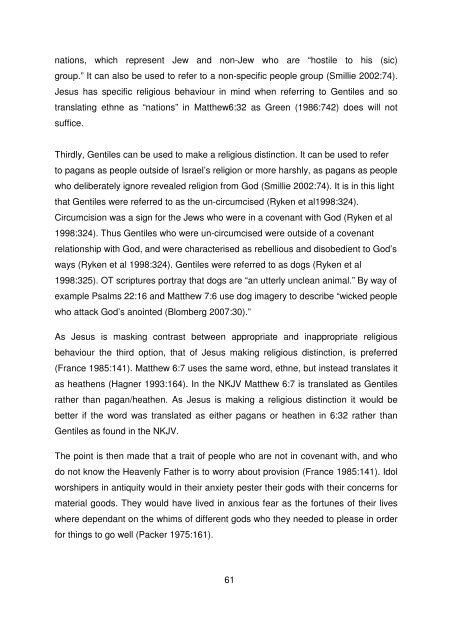O'Donoghue MTh_Thesis-FinalCopy.pdf - South African Theological ...
O'Donoghue MTh_Thesis-FinalCopy.pdf - South African Theological ...
O'Donoghue MTh_Thesis-FinalCopy.pdf - South African Theological ...
Create successful ePaper yourself
Turn your PDF publications into a flip-book with our unique Google optimized e-Paper software.
nations, which represent Jew and non-Jew who are “hostile to his (sic)group.” It can also be used to refer to a non-specific people group (Smillie 2002:74).Jesus has specific religious behaviour in mind when referring to Gentiles and sotranslating ethne as “nations” in Matthew6:32 as Green (1986:742) does will notsuffice.Thirdly, Gentiles can be used to make a religious distinction. It can be used to referto pagans as people outside of Israel’s religion or more harshly, as pagans as peoplewho deliberately ignore revealed religion from God (Smillie 2002:74). It is in this lightthat Gentiles were referred to as the un-circumcised (Ryken et al1998:324).Circumcision was a sign for the Jews who were in a covenant with God (Ryken et al1998:324). Thus Gentiles who were un-circumcised were outside of a covenantrelationship with God, and were characterised as rebellious and disobedient to God’sways (Ryken et al 1998:324). Gentiles were referred to as dogs (Ryken et al1998:325). OT scriptures portray that dogs are “an utterly unclean animal.” By way ofexample Psalms 22:16 and Matthew 7:6 use dog imagery to describe “wicked peoplewho attack God’s anointed (Blomberg 2007:30).”As Jesus is masking contrast between appropriate and inappropriate religiousbehaviour the third option, that of Jesus making religious distinction, is preferred(France 1985:141). Matthew 6:7 uses the same word, ethne, but instead translates itas heathens (Hagner 1993:164). In the NKJV Matthew 6:7 is translated as Gentilesrather than pagan/heathen. As Jesus is making a religious distinction it would bebetter if the word was translated as either pagans or heathen in 6:32 rather thanGentiles as found in the NKJV.The point is then made that a trait of people who are not in covenant with, and whodo not know the Heavenly Father is to worry about provision (France 1985:141). Idolworshipers in antiquity would in their anxiety pester their gods with their concerns formaterial goods. They would have lived in anxious fear as the fortunes of their liveswhere dependant on the whims of different gods who they needed to please in orderfor things to go well (Packer 1975:161).61
















